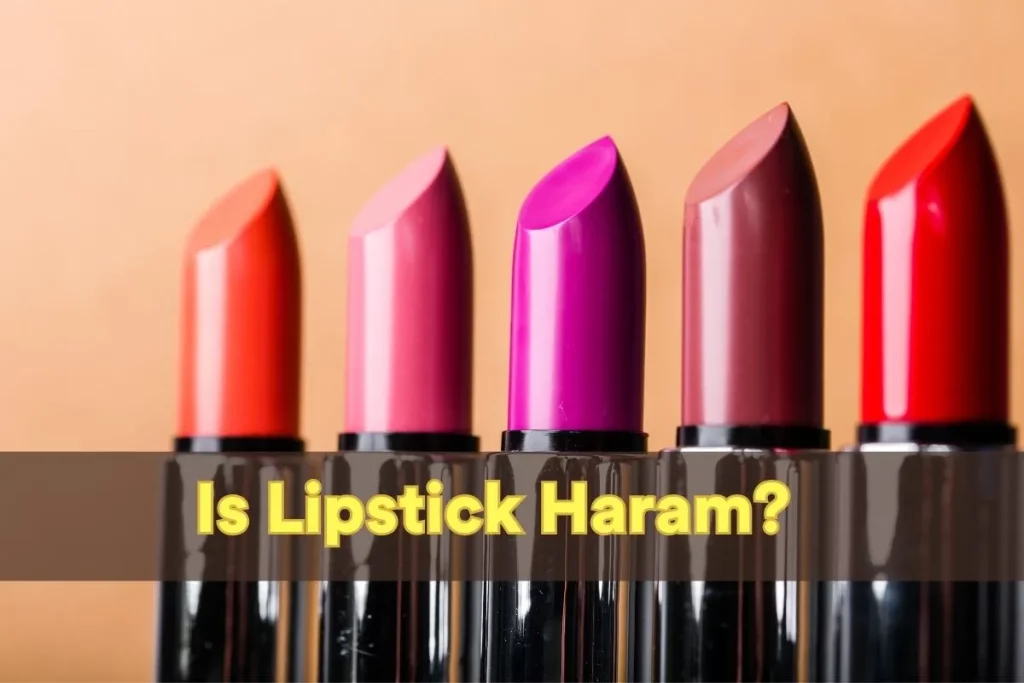Assalamualaikum, gorgeous souls navigating the vibrant world of beauty and faith! 🌟 You know, amidst the dazzling array of makeup products, from the ever-popular nail polish to the eye-enhancing mascara, there lies a question that many of us find ourselves pondering – “Is Lipstick Haram?”
It’s a topic that gracefully dances at the intersection of beauty and religious teachings, offering a rich ground for exploration and understanding. So, let’s take a little deeper about it, shall we?
Key Takeaways
| 📌 Lipstick in Islam: Lipstick is generally considered permissible (mubah) in Islam, as long as it is applied in moderation and without extravagance. |
| 📌 Ingredient Awareness: It’s important for individuals to be aware of the ingredients in lipstick, as some, like carmine and certain animal fats, could potentially be considered haram (forbidden). |
| 📌 Halal-Certified Options: Many brands offer halal-certified lipsticks, ensuring that they do not contain any haram components, making it easier for individuals to align their makeup choices with their religious beliefs. |
Is Lipstick Haram in Islam?

Drawing from the teachings presented in the book Al-Tamhid Lima fil Al-Muwaththa min Al-Ma’ani wa Al-Asanid written by Ibn ‘Abd al-Barr, grooming and adorning oneself is generally considered mubah, or allowed in Islam. This encompasses a range of adornments including the application of lipstick for women.
The guiding principle here is moderation; the adornment should not be excessive, display luxury, or resonate with arrogance. It is also encouraged to maintain a neat and modest appearance, a sentiment echoed by the Prophet ﷺ when he mentioned:
وَعَنِ اِبْنِ عُمَرَ -رَضِيَ اَللَّهُ عَنْهُمَا- قَالَ: قَالَ رَسُولُ اَللَّهِ - صلى الله عليه وسلم - { اَلْحَيَاءُ مِنْ اَلْإِيمَانِ }
مُتَّفَقٌ عَلَيْهِ .
Ibn ‘Umar (RAA) narrated that the Messenger of Allah (ﷺ) said:
“Haya (modesty, bashfulness, etc.) is a part of Faith.”
Therefore, wearing lipstick aligns with Islamic principles as long as it is done tastefully, without going overboard with flashy colors. Moreover, it holds a special place when it comes to pleasing one’s husband, steering clear from the realms of being considered haram.
Ingredients in Lipstick
Common Ingredients
Before we move further, let’s understand what goes into making that vibrant tube of lipstick that complements your nail polish so well. Common ingredients include waxes, oils, and pigments which give lipstick its structure, moisture, and color respectively.
Possible Haram Ingredients
However, it is crucial to be aware of certain ingredients that could potentially be considered haram, such as carmine, which is derived from insects, and certain animal fats. Being informed about these ingredients is essential in making a choice that aligns with your beliefs.
Here’s a closer look at the common ingredients that are often found in lipsticks:
- Waxes: Be it beeswax, carnauba, or candelilla, waxes are the backbone of lipsticks, giving them structure and a smooth application.
- Oils: Oils such as castor oil, lanolin, or mineral oil, add moisture and shine to the lipstick, ensuring your lips stay hydrated.
- Pigments: These are responsible for the vibrant hues we adore. Pigments can be derived from various sources, including minerals and synthetic compounds.
- Emollients: Ingredients like shea butter and cocoa butter are added to nourish the lips and provide a smooth texture.
- Preservatives: To increase the shelf life of the lipstick, preservatives are added to prevent bacterial growth.
- Antioxidants: Vitamins like E and C are often added to lipsticks to protect the lips from environmental damage.
While enjoying the beautiful shades of lipsticks, it is equally important to be aware of the ingredients that might not align with Islamic principles. Here are some ingredients that could potentially be considered haram:
- Carmine: Derived from crushed cochineal insects, carmine is used to achieve bright red and pink hues.
- Animal Fats: Certain lipsticks contain fats derived from animals, which might not be halal.
- Lanolin: Although a common ingredient, lanolin is derived from the sebaceous glands of wool-bearing animals, raising concerns regarding its permissibility.
- Gelatin: Sometimes used as a binding agent, gelatin can be derived from non-halal sources, making it a questionable ingredient.
To help you navigate the complex world of lipstick ingredients, here is a simple table highlighting the common and potentially haram ingredients:
| Ingredient | Role in Lipstick | Concerns |
|---|---|---|
| Waxes (e.g., beeswax) | Structure and smooth application | Mostly permissible |
| Oils (e.g., castor oil) | Adds moisture and shine | Mostly permissible |
| Pigments | Provides color | Varies; some pigments might be derived from haram sources |
| Carmine | Bright red and pink hues | Derived from insects; considered haram |
| Animal Fats | Adds texture and moisture | Potentially haram depending on the source |
| Lanolin | Moisturizing agent | Derived from wool-bearing animals; potentially haram |
| Gelatin | Binding agent | Potentially haram depending on the source |
Halal Lipstick
In response to concerns regarding the ingredients in makeup products, there has been a rise in brands offering halal-certified lipsticks, ensuring the absence of any haram components. These lipsticks are not just confined to being halal but also often venture into being organic and cruelty-free, offering a guilt-free beauty experience.
There are several brands that offer halal-certified lipsticks. These lipsticks are formulated without any haram (forbidden) ingredients, ensuring they adhere to Islamic dietary laws. Here are some brands and products you might consider:
Brands Offering Halal-Certified Lipsticks
- Amara Halal Cosmetics
- Product Example: Amara Organic Lipstick
- Features: This brand offers a range of organic lipsticks that are not only halal but also cruelty-free and vegan.
- PHB Ethical Beauty
- Product Example: PHB 100% Pure Organic Lipstick
- Features: Their lipsticks are handmade and contain organic shea butter and jojoba oil, providing nourishment to your lips while being halal-certified.
- Tuesday in Love
- Product Example: Tuesday in Love Lipstick
- Features: This brand offers a wide variety of halal-certified lipsticks that are also water-permeable, allowing water to penetrate through the lipstick, which is a significant feature for many Muslim women.
- Inika Organic
- Product Example: Inika Organic Vegan Lipstick
- Features: While not exclusively halal-certified, their products are vegan and cruelty-free, adhering to many principles that align with halal certification.
Things to Consider When Buying Halal Lipsticks
- Certification: Ensure the product has a halal certification from a recognized halal certification body.
- Ingredients: Check the ingredients list to ensure it does not contain any haram substances like carmine or alcohol.
- Cruelty-Free: Many halal-certified products are also cruelty-free, meaning they are not tested on animals.
- Vegan: Some halal lipsticks are also vegan, meaning they do not contain any animal-derived ingredients.
Conclusion
As we wrap up, it is evident that lipstick, much like other makeup products such as mascara and nail polish, holds a permissible place in Islam when used in moderation and with a conscious choice of ingredients. It stands as a testimony to the fact that faith and personal grooming can coexist harmoniously, offering a pathway to express oneself while adhering to one’s beliefs.
Frequently Asked Questions
Does using lipstick go against Islamic beliefs?
No, using lipstick does not inherently go against Islamic beliefs as long as it is used in moderation and does not display excessive or tabarruj.
What are the ingredients commonly used in lipstick?
Lipsticks commonly contain waxes, oils, and pigments. However, one should be cautious about potential haram ingredients like carmine and certain animal fats.
Is it permissible for hijabis to wear lipstick?
Yes, it is permissible for hijabis to wear lipstick, especially when it is to please the husband and as long as it is not flaunted excessively in public.
Can lipstick be considered haram due to its ingredients?
Yes, lipstick can be considered haram if it contains ingredients that are prohibited in Islam, such as certain haram animal-derived components.
What is the ruling on using tinted lip balm in Islam?
Using tinted lip balm follows the same ruling as lipstick; it is permissible as long as it adheres to the principles of moderation and does not contain haram ingredients.
- Is Pop Tarts Halal? What You Need to Know - February 18, 2024
- Are Graham Crackers Halal in Islam? - January 19, 2024
- Is Keebler Wheatables Halal? - January 18, 2024





